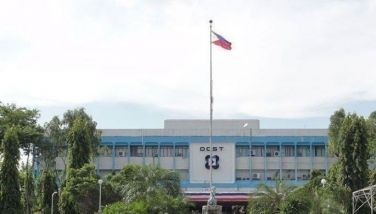Asean ministers to sign 2 accords on trade, capital mart dev’t
July 28, 2003 | 12:00am
Association of Southeast Asian (ASEAN) countries finance ministers are expected to sign two critical protocols on trade and capital market development when the ASEAN Finance Ministers Meeting (AFMM) convenes in Manila for a seven-day conference starting this week.
Finance officials disclosed over the weekend that the AFMM would sign the agreement that would implement the harmonized Asean tariff nomenclature, a critical protocol for the completion of the Asean Free Trade Agreement (AFTA).
Also on the table was the signing of the protocol creating the Asean Cooperation Fund that would finance the succeeding meetings of the AFMM, with initial funds to be donated by Asean member countries as well as Japan, China and South Korea that together constitute the Asean +3.
Finance Undersecretary Juanita Amatong said the seven-day meeting would focus on the so-called Roadmap for Financial Cooperation and a draft proposal has already been made by Singapore.
"The finance ministers realize that the AFTA would not prosper if the supporting financial system is not there," Amatong pointed out. "Clearing and payments, for example, would not be possible if we have not laid down the financial groundwork."
Amatong said the Singapore proposal would be discussed the day before the meeting commences on Aug. 1, encompassing the integration of the capital market beginning with the proposed Asian Bond Market, the implementation of the Asean Surveillance Process for intra-regional transaction and even the long-discussed common Asean currency.
According to Amatong, the Singapore proposal would look at three major issues on capacity building measures, the regulatory regime and the harmonization of codes and standards.
"We have to do this because the development of the capital and financial markets in the region is very uneven," Amatong explained. "There are talks of cross-border investments but how is this going to be possible without some kind of rationalization and harmonization?"
The AFMM was originally scheduled last May but had to be canceled due to the SARS epidemic. Amatong said the meeting would start with the meetings of Asean finance ministers and then proceed on the final leg as an Asean + 3 meeting.
Expected to arrive are finance officials from China, Japan and South Korea which constitutes the Asean + 3 along with the regular Asean members.
Amatong said the meeting would tackle the same agenda lined up last May, with main concerns focusing on capital market development, common currency and agreements under the Chang Mai Initiative.
According to Amatong, more specific discussions are likely to take place on the Asian Bond Market, an initiative formally launched by the creation of the Asian Bond Fund (ABF) early last month.
The AFMM meeting would take off from the Fifth Ministerial meeting of the Asian-Europe Finance Ministers meeting held last week in Bali, Indonesia where Finance Secretary Jose Isidro Camacho was in attendance.
According to Camacho, SARS was still discussed in the Bali meeting and the assembly was largely satisfied with the public health measures implemented by governments in Asia to contain the epidemic.
The ASEM also supported the progress in the regional financial cooperation in the Asean +3 which initiated the creation of the Asian Bond Markets initiative, beginning with the launch of the Asian Bond Fund by 11 Asian economies.
The $1-billion Asian Bond Fund was launched last month and the Bangko Sentral ng Pilipinas (BSP) said it was investing $100 million that would be invested initially on regional sovereign bonds.
Finance officials disclosed over the weekend that the AFMM would sign the agreement that would implement the harmonized Asean tariff nomenclature, a critical protocol for the completion of the Asean Free Trade Agreement (AFTA).
Also on the table was the signing of the protocol creating the Asean Cooperation Fund that would finance the succeeding meetings of the AFMM, with initial funds to be donated by Asean member countries as well as Japan, China and South Korea that together constitute the Asean +3.
Finance Undersecretary Juanita Amatong said the seven-day meeting would focus on the so-called Roadmap for Financial Cooperation and a draft proposal has already been made by Singapore.
"The finance ministers realize that the AFTA would not prosper if the supporting financial system is not there," Amatong pointed out. "Clearing and payments, for example, would not be possible if we have not laid down the financial groundwork."
Amatong said the Singapore proposal would be discussed the day before the meeting commences on Aug. 1, encompassing the integration of the capital market beginning with the proposed Asian Bond Market, the implementation of the Asean Surveillance Process for intra-regional transaction and even the long-discussed common Asean currency.
According to Amatong, the Singapore proposal would look at three major issues on capacity building measures, the regulatory regime and the harmonization of codes and standards.
"We have to do this because the development of the capital and financial markets in the region is very uneven," Amatong explained. "There are talks of cross-border investments but how is this going to be possible without some kind of rationalization and harmonization?"
The AFMM was originally scheduled last May but had to be canceled due to the SARS epidemic. Amatong said the meeting would start with the meetings of Asean finance ministers and then proceed on the final leg as an Asean + 3 meeting.
Expected to arrive are finance officials from China, Japan and South Korea which constitutes the Asean + 3 along with the regular Asean members.
Amatong said the meeting would tackle the same agenda lined up last May, with main concerns focusing on capital market development, common currency and agreements under the Chang Mai Initiative.
According to Amatong, more specific discussions are likely to take place on the Asian Bond Market, an initiative formally launched by the creation of the Asian Bond Fund (ABF) early last month.
The AFMM meeting would take off from the Fifth Ministerial meeting of the Asian-Europe Finance Ministers meeting held last week in Bali, Indonesia where Finance Secretary Jose Isidro Camacho was in attendance.
According to Camacho, SARS was still discussed in the Bali meeting and the assembly was largely satisfied with the public health measures implemented by governments in Asia to contain the epidemic.
The ASEM also supported the progress in the regional financial cooperation in the Asean +3 which initiated the creation of the Asian Bond Markets initiative, beginning with the launch of the Asian Bond Fund by 11 Asian economies.
The $1-billion Asian Bond Fund was launched last month and the Bangko Sentral ng Pilipinas (BSP) said it was investing $100 million that would be invested initially on regional sovereign bonds.
BrandSpace Articles
<
>
- Latest
- Trending
Trending
Latest
Trending
Latest
Recommended





























